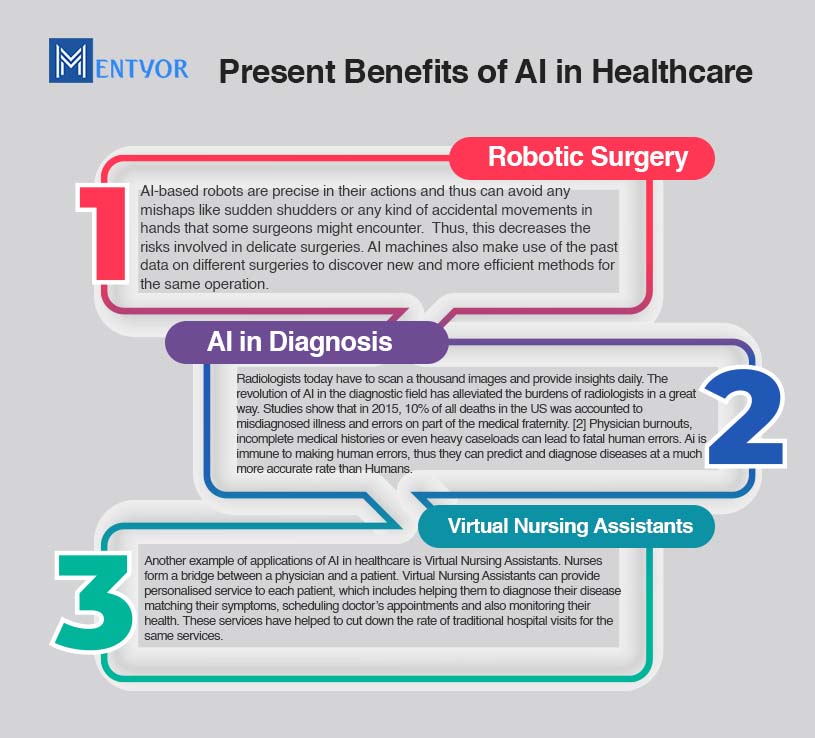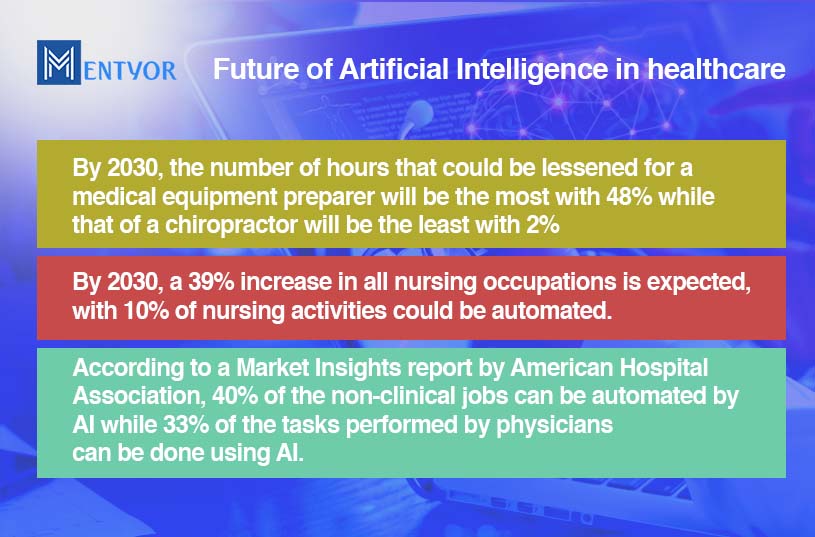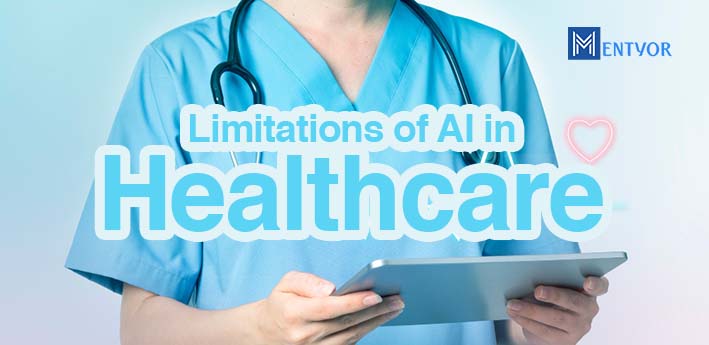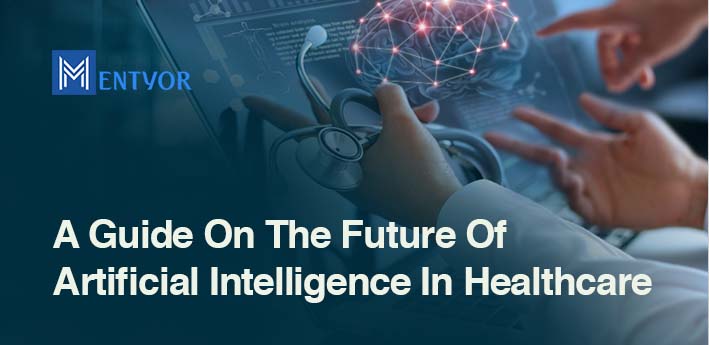Artificial Intelligence is a field that holds a tremendous amount of prominence presently. Whether it is something as simple as the vacuum cleaning robots at home, or even social media that we scroll through every day or just simply “Googling” a query, AI is everywhere.
The future of Artificial Intelligence in Healthcare is also full of potential, hope and innovations. AI aims to make our life easier and thus more developments are underway to make it a reality.
Fantastical Human-like robots who are ready to topple mankind are the first things to pop in our heads whenever we think of something as tech-related as Artificial Intelligence. All thanks to pop culture and the film and entertainment industry for peddling fatalistic sci-fi ideas related to AI. In truth, AI hasn’t reached the level of intelligence yet where it can have a mind of its own or even have self-awareness. But that doesn’t mean the future of Artificial Intelligence is any less exciting. Read on as we go deeper into the benefits of AI in healthcare and how it’s going to evolve in the future along with the risk and limitations involved with AI in healthcare.
Know what are the importance of Artificial Intelligence? What Is The Importance Of Artificial Intelligence?
Present Benefits of AI in Healthcare – Future Of Artificial Intelligence
The medical and healthcare industry is the one in which AI has made developments in leaps and bounds. Artificial Intelligence has managed to increase human life expectancy and improve quality of life in various ways. In a pandemic-driven world, Future of AI has come as a boon. Governments around the world used Artificial Intelligence to maintain social distance norms. Apart from that, hospitals have used Artificial Intelligence to speed up the process of covid-19 testing and diagnosis for patients who are in isolation by automated consultation chatbots.
In 2021, Th AI market on a worldwide scale was gauged to be around $10.4 Billion. The growth rate of AI in a global capacity is expected to be around 38.4% by 2030 [1]. It is hands-down one of the best applications of AI. Artificial Intelligence makes use of Big data through its Machine Learning algorithms to make medical diagnoses. Using its predictive analysis function, AI can map out better preventive care measures which are more accurate and proactive. A few examples of AI in Healthcare are:

Robotic Surgery – AI in Healthcare
Usually, Surgeries tend to depend upon the prowess and skills of the surgeon. But with Robots, a streamlined process that remains constant across all surgeries can be developed.
The changes in case-to-case based surgeries can be avoided with the assistance of AI-driven robots. AI-based robots are precise in their actions and thus can avoid any mishaps like sudden shudders or any kind of accidental movements in hands that some surgeons might encounter. Thus, this decreases the risks involved in delicate surgeries. AI machines also make use of the past data on different surgeries to discover new and more efficient methods for the same operation.
AI in Diagnosis
Radiologists today have to scan a thousand images and provide insights daily. The revolution of AI in the diagnostic field has alleviated the burdens of radiologists in a great way. Studies show that in 2015, 10% of all deaths in the US was accounted to misdiagnosed illness and errors on part of the medical fraternity. [2] Physician burnouts, incomplete medical histories or even heavy caseloads can lead to fatal human errors. Ai is immune to making human errors, thus they can predict and diagnose diseases at a much more accurate rate than Humans.
Virtual Nursing Assistants – Future of AI in healthcare
Another example of applications of AI in healthcare is Virtual Nursing Assistants. Nurses form a bridge between a physician and a patient. Virtual Nursing Assistants can provide personalised service to each patient, which includes helping them to diagnose their disease matching their symptoms, scheduling doctor’s appointments and also monitoring their health. These services have helped to cut down the rate of traditional hospital visits for the same services.
These examples are only just the tip of the iceberg when it comes to the usage of AI in healthcare. The future of Artificial Intelligence in Healthcare is only going to be lined with innovations and technology.
Know Interesting Applications of AI across Industries: Artificial World : 11 Interesting Applications Of AI across Industries
Future of Artificial Intelligence in healthcare – AI in healthcare

One of the greatest concerns that come with the development of AI is the fear of losing jobs to smarter and more efficient machines. But the McKinsey Global Institute conducted a study that shows that although automation brought by AI will affect every industry to different degrees, but the changes in the healthcare sector will be the least. [3] As the hours spent in healthcare that can actually be automated only account for 35% of the time spent, hence the rate of automation in healthcare will be low.
Plus it also depends upon the job roles. The report also projects that by 2030, the number of hours that could be lessened for a medical equipment preparer will be the most with 48% while that of a chiropractor will be the least with 2%
The study highlights that in European healthcare, the problems with the shortage of healthcare providers can be lessened with the help of automation. By 2030, a 39% increase in all nursing occupations is expected, with 10% of nursing activities could be automated. [ future in AI ]
The future of Artificial Intelligence in Healthcare can completely change the face of medical exploration. As healthcare providers integrate more AI-driven methodologies in their daily workings, more will be the ease of driving innovations by understanding the requirements of the job. Al can definitely make our life easier but to incorporate Artificial Intelligence in the healthcare industry will require learning skills related to AI and handling and working with these machines on the part of the healthcare providers as well.
According to a Market Insights report by American Hospital Association, 40% of the non-clinical jobs can be automated by AI while 33% of the tasks performed by physicians can be done using AI. [4]
The incorporation of AI in non-clinician tasks will mean an unfortunate loss of jobs for the non-clinical staff. But a host of new job titles will also crop up due to the integration of AI. Although these job titles will require certain skills and competencies in handling and working with AI. As such this has also become a topic of debate whether the strata of society that AI will be replacing at the work front can actually cope with the level of skills and education that the newer jobs will require.
A report by Business Insider Intelligence attributes 30% of the costs in the healthcare industry to repetitive administrative tasks like maintaining records, scheduling appointments for patients, billing etc. If AI is used to automate these tasks, then administrative costs will be fewer and also a window for fewer human errors.
Limitations of AI in Healthcare

- It’s a human tendency to avoid change. And as such not all hospitals have incorporated AI in their arsenal. There is reluctance and mistrust in using AI by healthcare professionals mostly due to not having enough trust in the efficacy and the workings of a Machine in something as fragile as the matters of health of a patient.
- The future of Artificial Intelligence in Healthcare also depends on accumulating enough data to create robust AI algorithms that could help in healthcare industries. As we know, Data is categorized as the indispensable fuel of the new world. If data is fuel, then artificial intelligence is one of the engines that run on data. To ensure that the AI-driven machine works properly, more data is supposed to be fed to make the AI learn. Thus, the entire healthcare system would need to move to a more digitized way of collecting data from their patients. Another concern is the security of this high-quality data. Hospitals will require more well-thought-out robust policies of data-sharing between healthcare practitioners and also come up with better security for the very sensitive medical data from possible cybercrimes.
- AI researchers suggest that jobs will be created as many as AI replaces. But the one barrier that would remain is that a higher educational background may be required for these new vacancies created by AI. Since it’s not feasible for every stratum of society, hence the fear and uncertainty surrounding job automation still remain.
- Many questions have arisen about the accountability of AI machines. If an AI robot creates a mishap during surgery, what are the legal proceedings of that? Who is to take accountability for misdiagnosis by a consultation automated robot? Questions like these aims to make the companies responsible for these AI machines more cautious about their decisions and services. The incorporation of AI in the healthcare industry also requires a clear-cut framework of policies relating to the regulations of AI to assure safety for the patients. With clear cut boundaries and guidelines on the usage of AI, healthcare providers will also get a better idea of how they can use AI more lucratively. [Future of AI in healthcare]
10 Dangerous risks of AI you should know: Artificial World: 10 Dangerous Risks Of Artificial Intelligence
Frequently Asked Questions
Q1. Will AI take over humanity?
A1. The most prominent concern when it comes to the advent of technology is whether or not it will take over humanity and prove to be the better race. Currently, the sci-fi technology shown in movies that defeat humankind is still a stereotypical trope. ASI (Artificial Super Intelligence) that is often shown in movies has not been developed in reality yet. So rest assured, that the next robot invasion may not be anytime soon.
Q2. What Jobs will AI take over?
A2. The jobs that are repetitive in nature and can be automated without any human intervention are at the most risk of being replaced by AI. Jobs that require heavy labour and can also be dangerous and harmful for a person are also underway in being replaced by Artificially intelligent machinery.
Q3. Will Artificial Intelligence replace doctors?
A3. No, Artificial Intelligence can’t replace human doctors completely. Although major changes may occur in how a healthcare professional operates given that a lot of technology may become automated or inclined towards machine learning and Artificial Intelligence.
Conclusion
As AI becomes a part of every industry in the world, Future of AI in healthcare is no exception. The future of Artificial Intelligence in healthcare seems lucrative and driven by innovations. Although naysayers may blame machines and technology for the demise of humanity, you definitely cannot overlook the advantages that AI has brought into our lives. [ AI in Healthcare ]
Artificial Intelligence aims to create a world where machines can help humans to a better living standard. AI may seem like a fancy term only used by tech-giants around the world, but in reality, studies show that almost 37% of industries worldwide use Artificial Intelligence. During the Covid-19 pandemic, Artificial Intelligence was used for predicting and also tracking the spread of the disease. Researchers made use of data from social media platforms, calls and trustworthy news sources to forecast the early warning signs of the spread of the disease.
Whether it be using robots in assisting with ultra-delicate surgeries, or using AI to manufacture drugs fast, the future of Artificial Intelligence in healthcare promises to uplift the life expectancy and quality of humankind. As everything in this world comes with its pros and cons, so does AI. Thus, it depends upon us whether we wish to look towards the brighter side or focus more on the limitations. [future of Artificial Intelligence in Healthcare]
References
[1] Artificial Intelligence In Healthcare Market Report, 2022–2030. (n.d.). Grand View Research. https://www.grandviewresearch.com/industry-analysis/artificial-intelligence-ai-healthcare-market
[2] GE Electrics. (n.d.). Big Data, Analytics and Artificial Intelligence. GE Health Care. http://newsroom.gehealthcare.com/wp-content/uploads/2016/12/GE-Healthcare-White-Paper_FINAL.pdf
[3] Spatharou, A., Hieronimus, S., & Jenkins, J. (2021, July 1). Transforming healthcare with AI: The impact on the workforce and organizations. McKinsey & Company. https://www.mckinsey.com/industries/healthcare-systems-and-services/our-insights/transforming-healthcare-with-ai
[4] Market Insights: AI’s Impact on Health Care | AHA. (n.d.). American Hospital Association. https://www.aha.org/center/emerging-issues/market-insights/ai


 WhatsApp
WhatsApp